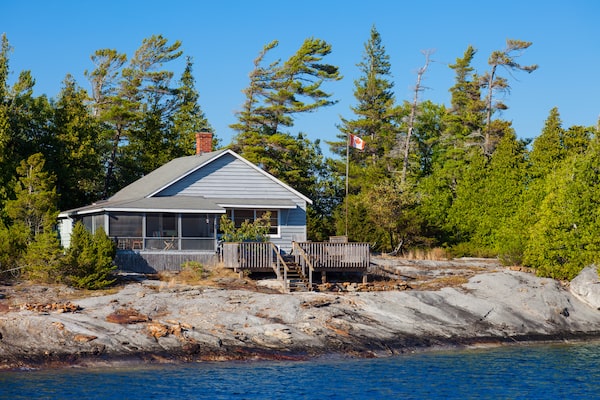
Lake Cottage with Canadian flag.Arpad Benedek/iStockPhoto / Getty Images
Most people save money and buy insurance to plan for life’s misfortunes – but bypass the inevitable misfortune of death, says Winnipeg-based funeral home operator Kevin Sweryd. Too often, he says, people leave funeral planning to loved ones they leave behind, which can mean paying more than they should for services as inflation creeps in each year. It also puts an extra burden on family members at the time of your death when all they want to do is grieve. But the trend is starting to change. Mr. Sweryd is seeing a growing number of people who are preplanning their funerals – and prepaying for them too – instead of leaving it for loved ones to sort out, Joel Schlesinger writes.
The perils of passing down the family cottage
Besides fighting through traffic snarls to get there, the family cottage by the lake has typically been viewed as a place of tranquillity with a lifetime of fond memories. For older vacation-property owners looking to hand ownership down to the next generation, however, the process can cause plenty of financial headaches and family drama without the proper planning. As Paul Brent reports, the best way to ensure the generation transition goes smoothly is to lay out in writing issues such as access to the property, responsibilities, overhead costs and sales options such as granting a right of first refusal to other family members.
When withdrawing funds early from your RRSP makes sense
Most Canadians spend their working lives socking away as much money as they can in their registered retirement savings plans (RRSPs) – often feeling guilty if they’re not maxing out the contribution limits set by the federal government. Once retirement rolls around, it’s time to switch gears and start planning how to use those RRSP funds to help replace employment income. There are clear rules about when you have to wind down your RRSP. Still, as Terry Cain reports, there are some situations where it makes sense to make some early withdrawals from your RRSP.
Why retirees need to be wary of sequence risk
When world markets took a nosedive in the early days of the COVID-19 crisis, many investors worried about the hit they saw on their returns in monthly statements. Those in the early days of retirement were particularly lucky that the pandemic-driven plummet proved to be short-lived. A prolonged downturn of that magnitude at the start of the period when you’re drawing on investments can have disastrous consequences on your long-term portfolio performance, experts say. Sequence-of-returns risk, also known as sequence risk, is the threat of receiving low or negative returns early in a period when withdrawals are being made. For retirees, it can have a significant impact on the overall value of a portfolio – and how long it lasts. Mary Gooderham writes about some pre-retirement strategies that can protect you.
Money for life: A closer look at the new Purpose Longevity Pension Fund
A pioneering new retirement product offers a step forward in Canadians’ continuing struggle to generate income for life. Most notably, it aims – but doesn’t guarantee – to deliver a 6.15-per-cent annual return for life on contributions made by a 65-year-old investor. The catch? The new Purpose Longevity Pension Fund, from Purpose Investments Inc. in Toronto, also demands that investors deal with a novel (and sometimes sticky) structure and accept some fundamental uncertainties. As Ian McGugan reports, the new product addresses a huge need among retirees desperate for steady sources of income in today’s low-return environment. But you have to know what is going on under the hood to gauge whether any of these products will suit your individual situation.
What else we’re reading
A childless Toronto couple wonder if they can spend $130,000 a year in retirement
It’s a dilemma many Canadians face as they near retirement – how much can they afford to spend without running out of money? So it is with Robert and Cynthia, a couple in their early 60s. Robert has already hung up his hat, leaving behind a sales job that earned him $150,000 a year on average. Cynthia is self-employed, earning $60,000 a year. She’s collecting a work pension and plans to retire fully this year. Together, they’re bringing in about $122,000 a year. Their high-earning years enabled the couple to save a substantial sum in addition to their $1.4-million suburban Toronto home. They have no children so no concern about leaving a big estate. Their retirement aspirations include travelling in Europe each year until they are 80, maybe renovating their home and donating to charity. They want to know what assets to draw on first and in what order. Dianne Malley asks Cherise Berman, a financial planner and principal of Bespoke Financial Consulting in Toronto, to look at the couple’s situation.
Stuck on what to say to someone about to retire? Here are some suggestions
Retirement is a huge milestone that can have mixed emotions for the person exiting the working world. It can be hard to know what the right thing is to say to them. This article looks at 110 of the best retirement wishes to write in a card (e-mail or text, if that’s your preference). For instance, you can play it straight by simply saying: “Wishing you all the happiness and joy retirement can bring!” Or maybe something a bit funnier such as “Enjoy the government money – you’ve contributed enough!” Or, perhaps a more pandemic-era workplace goodbye: “Just think, you’ll never have to sit in on another conference call. Enjoy your retirement!” Just add the word ‘video’ before ‘conference’ to make it even more relevant.

The Globe and Mail
Have a question about money or lifestyle topics for seniors, or want to suggest a story idea for the Sixty Five series? Please e-mail us at sixtyfive@globeandmail.com and we will find experts and answer your questions in future newsletters.